10 steps to take each day to stem the ageing process
There are many things you can do each day to put the brakes on aging. Here are our ten top tips to help slow down the aging process.

Aging is a major preoccupation for many people today! Whether it’s aging of the skin, the brain or indeed any physical capacity, most of us are actively seeking to maintain our natural physiological functions in as healthy a state as possible for as long as possible. While we may not be able to turn back the clock and achieve eternal youth, we can act, every day, to mitigate the effects of aging.
Let’s take a look at the steps we can take on a daily basis that, with very little effort, will help put the brakes on aging.
The first anti-aging rule: stay hydrated!
We sometimes forget that the body is primarily made up of water. It’s there in all our cells, especially in our skin: water plays a major part in the formation of dense epidermal tissue along with proteins such as collagen and elastin, giving the skin its suppleness and radiance. As we age, our skin naturally tends to become dehydrated, producing the familiar but unwelcome wrinkles, dark circles and slackness … Though we get a great deal of water from the diet, it’s not enough: we need to drink.
So what should we be drinking and how much? Around a liter and a half of fluid each day – primarily water, preferably still, plus small amounts of tea and infusions, throughout the day. Avoid sugary drinks and fruit juices – they deliver more sugar than they do hydration.
Support your bones and muscles with regular exercise
The musculoskeletal system is also a victim of aging: as we grow older, our bones lose density and become more fragile, the cartilage surrounding joints diminishes, and there’s a decrease in the number and volume of muscle fibres.
Taking regular exercise at all ages helps to prevent these unwelcome effects: bones remain strong for longer and the joints benefit from stronger muscles.
First and foremost, it’s important to choose an activity that you enjoy. Secondly, it’s best to pursue your chosen form of exercise in a regular, moderate way: no-one’s expecting you to run a marathon every day. Endurance activities are always a good choice: jogging, swimming, cycling … If you find exercise a challenge, start with a 30-minute walk every day: even this will significantly benefit your bones and muscles.
Take care of your eyes with vitamins A and C
Structural changes to the eyes result in declining vision as we age. The ciliary muscles soften and the lenses harden, making it more difficult to focus. It’s our near vision which is often affected. Aging is also a cause of cataracts and, as its name suggests, age-related macular degeneration (AMD).
Vitamin A Vitamin A is already present in the eyes where it plays a key role in sending light signals for conversion into images by the brain, maintaining good visual acuity (1). Vitamin C, a powerful antioxidant, has proven protective effects against cataracts and AMD, as has vitamin E (2).
To obtain good levels of vitamin A from the diet, opt for foods rich in beta carotene (it’s converted into vitamin A in the body): carrots and orange-red vegetables in general, as well as those with dark green leaves. For vitamin C, go for citrus fruits, peppers, cabbage …
Discover too our liposomal vitamin C supplement, probably the best on the market with an unrivalled level of absorption.Act daily to maintain your memory
Aging of the nerve cells can sometimes lead to cognitive problems and a loss of memory. But there are simple exercises you can do every day to help maintain healthy neurons, and as a result, good cerebral function and memory. First and foremost, have fun with words! Crosswords, puzzles, anagrams, word-based board games … Playing with vocabulary at any age helps stimulate the brain.
Diet also has a role to play: unsaturated fatty acids (omega-3 and omega-6, for example) and the B vitamins have been shown to have beneficial effects on memory (3,4). They’re found respectively in oily fish, and in dried fruits and green vegetables, as well as in specific dietary supplements.
Note: if you have any concerns about brain function, it’s important to seek medical advice to check for any underlying disease and obtain appropriate treatment if necessary.
Reduce oxidative stress by stopping smoking
Free radicals play a significant role in overall aging: they weaken cells, preventing cellular respiration and increasing permeability to aggressors. All cells are affected but in skin cells, the effects are more visible: dull, dry, wrinkled skin with no elasticity… What’s more, aging slows down cell renewal: delinquent cells are replaced less effectively by healthy cells, making them even more vulnerable to free radical attack.
Cigarettes contain a great many free radicals and impede the health-beneficial activity of antioxidants. Quitting smoking is thus essential for slowing down aging, as well as for overall health. Give yourself the best possible chance of success by using the various aids available such as mobile apps or ‘stop smoking’ support programs: take advice from health professionals and find the method that suits you best!
Get plenty of sleep
Lack of sleep exacerbates the aging process on a number of levels: it increases cognitive decline, reduces brain mass and aggravates the signs of premature skin aging such as wrinkles and bags under the eyes (5,6,7). There are several routes back to restorative sleep: reduce both your intake of stimulants (tea, coffee, alcohol) and screen time before bed, avoid eating heavy meals in the evening, practice visualisation sophrology or relaxation breathing techniques, try taking valerian-based herbal blends or supplement with melatonin to get to sleep more quickly, or even replace your old bedding !
If, despite your efforts, you’re still exhausted all the time, be sure to seek medical advice in case there’s an underlying disease that requires treatment.
Lower your exposure to phosphates by reducing your consumption of red meat
Red meat has been in the spotlight for some time as a source of unhealthy fats and a potential carcinogen. It is red meat’s high phosphate content that’s the culprit here: as a Scottish study suggests (8), when consumed in excessive amounts, phosphates accelerate cellular degeneration to the extent that they increase the risk of premature death. Phosphates are abundant in red and processed meat including charcuterie, and are also found in fizzy drinks and many ready meals.
To restrict your phosphate consumption, eat less red meat and fewer ready meals (or at least read the labels carefully).
Reduce your exposure to pollution
Air pollution, especially particulates, have a damaging effect on breathing, causing premature aging of the lungs and increasing the risk of respiratory diseases. Pollution and high ozone concentrations also accelerate aging of the skin (9).
To minimise these effects, reduce your exposure as much as possible by, for example, avoiding areas with heavy road traffic or significant industrial pollution. Instead, get out into nature whenever you can and breathe cleaner, purer air. When this is impossible, try at least to ensure your skin is free from pollutant residues by using a gentle cleanser, making sure you don’t lose the benefits by rubbing too vigorously.
Look after your cardiovascular system
Optimal blood flow requires flexible blood vessels, but with age, our arteries become stiff and less accommodating. Narrowing of the arteries increases the risk of cardiovascular disease, potentially leading to stroke and heart attack, amongst others. But there are simply ways of preventing the arteries from aging prematurely: alongside regular exercise and quitting smoking, reducing your intake of salt and ‘bad’ fats (ready meals, processed meat, animal fats…) is strongly recommended.
Promote youthful cells with specific dietary supplements
Have you heard of senolytics? An emerging area of anti-aging medicine, these molecules are beginning to attract interest among scientists. It seems they may help combat the senescent cells involved in very many of the body’s aging processes. Targeting these cells thus helps to slow down aging and stem the development of age-related diseases (10). Hopes are high about these senolytic molecules which include fisetin and quercetin, plant compounds with recognized antioxidant properties.
To minimise the unwelcome effects of premature aging, it’s important to adopt good habits and live by them every day. Nonetheless, aging is a natural and inevitable process and it’s undoubtedly best to accept it with good grace!
References
- Smith, Janine ; Steinemann, Thomas L. Vitamin A deficency and the eye. International Ophthalmology Clinics: October 2000 - Volume 40 - Issue 4 - p 83-91.
- Van Leeuwen R, Boekhoorn S, Vingerling JR, et al. Dietary Intake of Antioxidants and Risk of Age-Related Macular Degeneration. JAMA. 2005;294(24):3101–3107.
- Andrieu et al. Effect of long-term omega 3 polyunsaturated fatty acid supplementation with or without multidomain intervention on cognitive function in elderly adults with memory complaints (MAPT): a randomised, placebo-controlled trial, The Lancet Neurology, Volume 16, Issue 5, 2017, Pages 377-389.
- Janet Bryan, Eva Calvaresi, Donna Hughes, Short-Term Folate, Vitamin B-12 or Vitamin B-6 Supplementation Slightly Affects Memory Performance But Not Mood in Women of Various Ages, The Journal of Nutrition, Volume 132, Issue 6, June 2002, Pages 1345–1356.
- Alhola, P., & Polo-Kantola, P. (2007). Sleep deprivation: Impact on cognitive performance. Neuropsychiatric Disease and Treatment, 3(5), 553-567.
- Benedict C, Cedernaes J, Giedraitis V, Nilsson EK, Hogenkamp PS, Vågesjö E, Massena S, Pettersson U, Christoffersson G, Phillipson M, Broman JE, Lannfelt L, Zetterberg H, Schiöth HB. Acute sleep deprivation increases serum levels of neuron-specific enolase (NSE) and S100 calcium binding protein B (S-100B) in healthy young men. Sleep. 2014 Jan 1;37(1):195-8.
- Oyetakin-White P, Suggs A, Koo B, Matsui MS, Yarosh D, Cooper KD, Baron ED. Does poor sleep quality affect skin ageing? Clin Exp Dermatol. 2015 Jan;40(1):17-22.
- McClelland R, Christensen K, Mohammed S, McGuinness D, Cooney J, Bakshi A, Demou E, MacDonald E, Caslake M, Stenvinkel P, Shiels PG. Accelerated ageing and renal dysfunction links lower socioeconomic status and dietary phosphate intake. Aging (Albany NY). 2016; 8:1135-1149.
- Schraufnagel, Dean E. et al. Air Pollution and Noncommunicable Diseases. CHEST, 2019, Volume 155, Issue 2, 417 - 426.
- Kirkland, J. L., Tchkonia, T. , Zhu, Y. , Niedernhofer, L. J. and Robbins, P. D. (2017), The Clinical Potential of Senolytic Drugs. J Am Geriatr Soc, 65: 2297-2301.
Keywords
1 Days
repeat customer
recommended by my doctor. easy to create an account. Discounts and specials are appreciated. packaging and delivery is dependable. Capsules easy to digest. I've had some some capsules and tablets that are broken inside their bottles.
Kokee
6 Days
Order was shipped on time and packaged…Wonderful Jobs!
Order was shipped on time and packaged excellently.
DMHoge
12 Days
great products and prices
great products and prices
Marie
18 Days
Easy to navigate site
Easy to navigate site, had what I was searching for, good price. easy order-check out
James Tucker
24 Days
My skin is clearing up nicely!
Pretty good for my skin so far.
Christian
26 Days
The new packaging is excellent
The new packaging is excellent - finally! No more squashed boxes and torn envelopes.
GORAN
27 Days
Great Product
Great Product
Larry Garrett
31 Days
Quick shipping
Quick shipping; good price. No issues!
Mary McCarty
33 Days
Thr product is very good and is helping…
Thr product is very good and is helping me on my health. Then is always on time
LUGO Luz
35 Days
Buying was fine
Buying was fine. I had problems with the website not recognizing my login info, and had to call to get it fixed. Other than that, everything was good.
David S. Clark
36 Days
Your super maca and super ginseng are…phenomenal
Your super maca and super ginseng are phenomenal supplements that compliment each other when taking them together. Fantastic feeling of well-being and lots of mid day energy without the crash.
Keith Mason
38 Days
I have had amazing results with every…
I have had amazing results with every supplement I've purchased. I am extremely satisfied with this company
kirstin Torres
38 Days
Fine products
Fine products . They are on the leading edge of online supplements. The only issue -so far-is they sometime run out of subscription items.
Jason Argos
41 Days
The ordering process is very user…
The ordering process is very user friendly and the products always come in a timely manner.
CARTER Rhonda
42 Days
The price for Dr
The price for Dr. Pero's AC-11 is reasonable and in line with his views. (my former colleague). Keep it pure.
CAMPBELL Clayton




